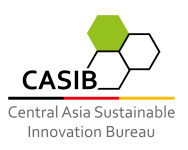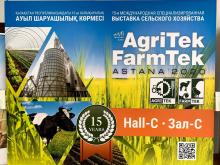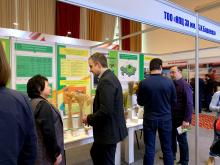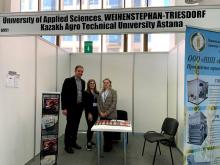The agricultural exhibition AgriTek/FarmTek with its continually high numbers of visitors takes place twice a year in Kazakhstan's capital Nur-Sultan (formerly Astana) and is by now a fixed benchmark in CASIB's calendar. As usual, the event provided ample opportunity for exchange with potential and existing project partners, a wide professional audience, and the interested public.
The Scientific Production Center of Grain Farming 'A. I. Baraev' is the country's leading institution in the field of applied agricultural research and an important partner in CLIENT II projects focussing on land use (ReKKS, LINOKAS). Among its core topics and specific contributions are:
- developing soil tillage practices designed to counteract erosion
- optimising the soil's carbon storage capacity
- water supply strategies
- plant protection plans that do justice to current developments and site-specific conditions
- variety testing
- nutrient analysis and corresponding recommendations for fertilisation
An in-depth conversation with Kanat Akshalov (Head of Soil and Crop Management Department) provided insight into the current state of ReKKS, possibilities for making the achievements permanent, and new project ideas building on current activities. The latter involves, for instance, gathering and analysing agricultural data using approaches based on remote sensing.
The German-Kazakh Agropolitical Dialogue, whose local staff changed recently, is based in Nur-Sultan and is also a regular participant in the exhibition. During this meeting, the main point of discussion were specific ideas of cooperation, especially concerning the development of strategies aiming to improve the opportunities for agricultural education in Kazakhstan. Furthermore, head of bureau Dr. Peter Liebelt had the chance to introduce the APD's new team to CLIENT II partners such as the farm machine manufacturer AMAZONE.
The commercial enterprise AMAZONE, represented at the exhibition by Prof. Dr. Tobias Meinel (General Director of Amazone Kazakhstan), has been involved in joint research projects in the field of agricultural science for many years and is currently working on procedures for liquid fertilisation, extremely shallow soil tillage, and selective plant protection, the prospects of which on the market were the main point of interest in this meeting. However, subsequent project approaches such as the question of whether fallows are a necessity were also brought up.
In addition, there was a meeting with members of the Kazakh Agrotechnical University S. Seifullin, which recently received a modern laboratory for soil analysis within the framework of ReKKS. Here, too, the objective was to stay in the loop regarding current activities as well as to inform about other related activities in order to create a holistic understanding of ongoing efforts in the agricultural sector.
Acting as the representation of Martin Luther University Halle-Wittenberg abroad, the team also gave comprehensive advice to students and parents who had questions about the specifics of studying abroad in Halle (course catalogue, entry requirements, ...) – an offer that was gladly taken up by many.
- Log in to post comments



